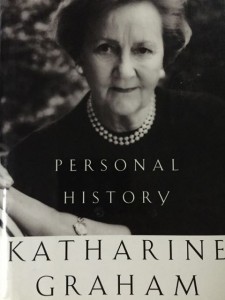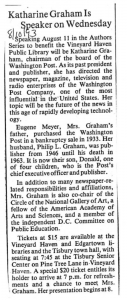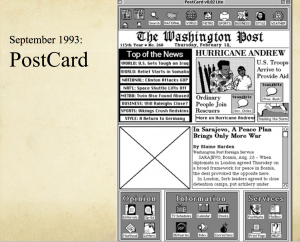The Post: Film About Katharine Graham, Unsure to Unstoppable
Recently, I saw The Post, starring Meryl Streep and Tom Hanks. The film centers on a damning Vietnam War study and Washington Post publisher Katharine Graham’s most-difficult decision in 1971.

At the beginning of the film, I was confused by a Katharine Graham who was unsure of herself and reluctant to ruffle the feathers of her editors, advisors, and cronies in Washington’s high places. You see, the Katharine Graham I heard speak 25 years ago, while poised and refined, did not seem to be concerned about offending anyone.

Newspaper reproduction appears courtesy of the Vineyard Gazette, a weekly newspaper published on Martha’s Vineyard. Online at vineyardgazette.com. Copyright Vineyard Gazette, all rights reserved.
In August of 1993, my family and I spent our vacation in a cozy cottage overlooking Lagoon Pond. At the time, I was the mother of three small children, a non-traditional college student, and an aspiring writer. On the evening of August 11, I left my husband in charge of the kids and I drove to the Tisbury Senior Center to hear Katharine Graham, by that time chairman of the board at The Washington Post, talk about the future of news in the digital age.
Here is what I wrote in my journal that evening:
August 11, 1993 – Tonight, I went to the Tisbury Senior Center to hear Katharine Graham from The Washington Post speak about the future of news reporting in light of all of the technical developments happening. I saw CD-ROM news magazines and a prototype of PostCard, a newspaper for notebook PC’s of the future. PostCard can have moving pictures and sound. With the sound, you would be able to listen to your newspaper in your car during your commute to work. Ms. Graham also had some interesting predictions on the future of television shopping networks. She feels that they are the thing of the future and with interactive televisions, we will be able to order merchandise right from our television sets. It was very interesting and I am glad I went.
Looking back on this journal entry today, I find it amusing, but it was profound at the time. In 1993, there was no Internet to speak of. I owned a laptop that cost $2,500, weighed a ton, and stored very little data. All it was good for was word processing. To think that one could view moving pictures and sound on such a device was truly amazing for me. CDs were still relatively new at that time, and I’m sure I was still listening to James Taylor on cassette tapes.

http://slideplayer.com/slide/5348431/
PostCard, the digital newspaper that Katharine Graham told us about, was short-lived and was quickly replaced by iterations of interactive technology. A slideshow of the journey from PostCard to WashingtonPost.com was about all I could find in a Google search about PostCard.
In 1993, we had no idea that we’d be holding our news in the palms of our hands to be read anywhere, anytime. We don’t need to have the news read to us in the car. We can listen to CNN or Fox News on our Sirius XM radio. We can stream podcasts through our Bluetooth-connected speakers. News is at our fingertips and is almost as good as a chip in the head.
Ms. Graham’s reference to television shopping networks is amusing, but the concept of being able to place orders quickly and conveniently was a vision. Most of us don’t sit and watch TV to shop, but the ability to purchase on demand is very much a part of our lives now. Smart TVs offer interaction, but the rapid rise of mobile technology has made it nearly unnecessary. Yes, we can navigate through our television to Amazon, but why bother, when we can tap through an app on our phone and have our purchase at our doorstep in two days? (Well, that’s how Amazon Prime is supposed to work anyhow.)
As I mentioned earlier, the Katharine Graham that Meryl Streep portrayed at the beginning of The Post film doesn’t seem anything like the one I saw in 1993. But you know what? The Katharine Graham at the end of the movie was very much like the one who made an impression upon me as a woman who hoped to enter the publishing world. Graham had the Pentagon Papers to thank for that. A classified report had been leaked to the New York Times, which after running three excerpts was issued an injunction to cease publication. Subsequently, the report was dropped off at The Washington Post, and Katharine Graham’s advisors were split on whether they should run excerpts or not. In the end, only Graham could make the final decision. She decided to print, even though she risked going to jail. In the end, the Supreme Court ruled in favor of the New York Times and a sigh of relief could be heard from Times Square to L Street.
Deciding to report on the Pentagon Papers wouldn’t be the end of bold moves for The Washington Post publisher. Soon, Graham would support two Post reporters in their investigation of the Watergate break-in. The Post film ended with a scene of the break-in, hinting at a sequel. . .




Leave a Reply